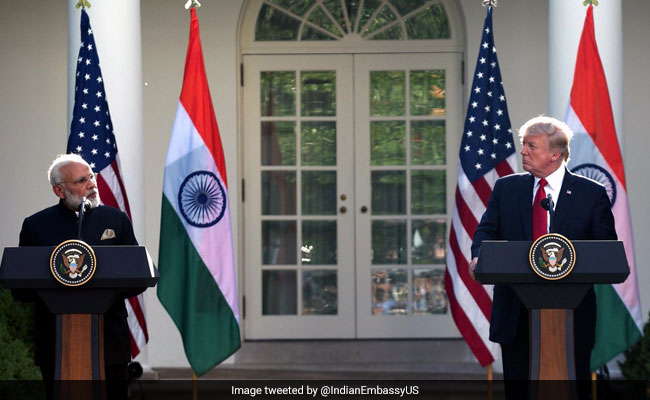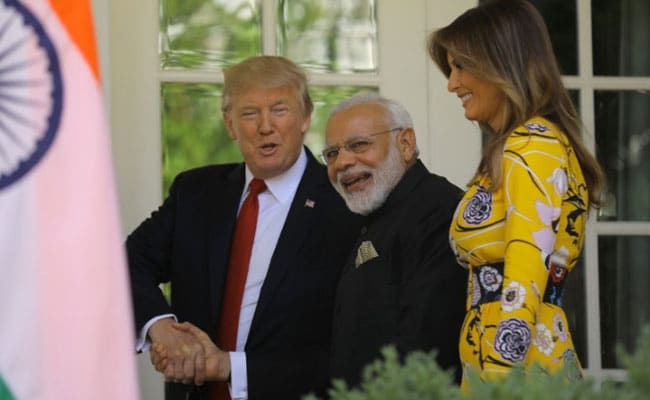There is a lot to analyse, and possibly over-analyse, about the recent meeting between Prime Minister Narendra Modi and U.S. President Donald Trump. There were some notable surprises, including the
strong language used when condemning Pakistan for its refusal to crack down on terrorist groups operating across borders. There were also some welcome signs of continuity, including the United States' recognition of India as a Major Defense Partner, support for India's membership to export control regimes and the U.N. Security Council, and commonality of views on Afghanistan's stability and on cyberspace. New Delhi should be more than satisfied with these broad stated contours for cooperation, which should put to rest some concerns about the Trump administration's orientation.
Of course, there was also plenty of symbolism: the
bear hugs, the warm rhetoric, and the invitation extended to Ivanka Trump for the Global Entrepreneurship Summit in India. There was the high profile participation on the U.S. side, including many senior cabinet officials, two of whom - Secretary of Defense James Mattis and Secretary of State Rex Tillerson - called upon Modi separately for private discussions. And there was the occasion itself. U.S. officials told
The Washington Post that inviting Modi to a working dinner in the White House was "meant to signal respect."
PM Narendra Modi, US President Donald Trump addressing the media together at the White House
But amid all the surprises and continuity, the pomp and personal rapport, two takeaways really stand out from this meeting. One concerns India-U.S. convergence in the Indo-Pacific. This really was the headline from the visit, and underscored the central strategic rationale for the bilateral relationship. While not using the same language, perhaps too closely associated now with the Barack Obama administration, the meeting reflected an effective continuation of the
Joint Strategic Vision for the Asia-Pacific and Indian Ocean Region, which was agreed in January 2015. The latest
statement encompasses common principles concerning the freedom of navigation, overflight, and commerce, and the peaceful resolution of disputes in the region. Indian Ocean security - whether U.S. involvement in the Indian Ocean Naval Symposium or the centrality of the Malabar naval exercises - features prominently. The U.S. offer to sell Sea Guardian unarmed drones could mark a major contribution to India's ability to monitor the Indian Ocean, just as India's earlier acquisition of P-8I maritime surveillance aircraft proved a game-changer.
But what really stands out in the
joint statement is a passage on regional economic connectivity. It outlines a set of principles, specifically that such connectivity should be based on "the transparent development of infrastructure and the use of responsible debt financing practices, while ensuring respect for sovereignty and territorial integrity, the rule of law, and the environment." These principles closely
reflect India's prior statement of May 13 concerning its refusal to participate in the Belt and Road Forum in Beijing. Some Indian commentators felt that India was being "
isolated" when it opted to boycott the Forum, a major diplomatic initiative of the Chinese government. But the U.S. endorsement of principles first articulated by India, coupled with similar concerns described separately by the
European Union and
Japan, has put India in the unusual position of being a normative leader when it comes to regional connectivity, an increasingly important arena of international competition. The challenge, moving forward, is how India can further articulate, promote, and enforce such norms in its extended neighbourhood and beyond.
PM Narendra Modi received a red carpet welcome at the White House
If strategic considerations witnessed a remarkable degree of confluence, bilateral issues still reflect some differences between Trump's America and Modi's India. Beyond the broad principles of free trade, open markets, and converging values, these issues were notable for their absence in the terse
joint statement. In many ways, this reflects the changed political dynamics of the United States under Trump. The two sides gave a nod to more balanced trade and reintroduced "clean coal" to the energy cooperation portfolio. Standing together in the Rose Garden, Trump also highlighted the two leaders' shared domestic objectives of economic growth, infrastructure spending, anti-corruption efforts, and tax reform, while Modi paid lip service to Trump's motto: "Make America Great Again." Many traditional agenda items that had focused on India's transformation - from women's empowerment and climate change to smart cities and educational initiatives - were also conspicuously absent. Some prior strategic projects, including the Defence Technology and Trade Initiative and the aircraft carrier technology working group, also did not feature, being either politically tainted by their association with a previous administration or appearing too one-sided for the White House's current incumbents.
A day after Modi left Washington, U.S. Vice President Mike Pence offered a
clearer articulation of his administration's approach to bilateral business relations with India in a speech to the U.S.-India Business Council. While clearly stating Trump's economic priorities, he reinforced the message that "our two great nations [the United States and India] are bound...by commerce." Noting that U.S. exports to India support roughly 200,000 jobs, he highlighted civil aviation, energy, and defence as three sectors in which business with India is a boon for the American economy. Perhaps this goes to sow that although a panoply of bilateral issues went unaddressed at Modi's first meeting with Trump, some ways might still be found to make 'America First' compatible with India's transformation.
(Dhruva Jaishankar is Fellow, Foreign Policy with Brookings India in New Delhi.)Disclaimer: The opinions expressed within this article are the personal opinions of the author. The facts and opinions appearing in the article do not reflect the views of NDTV and NDTV does not assume any responsibility or liability for the same.




